八年级英语下册UnitCouldyoupleasecleanyourroomSelfCheck练习课件人教版
八年级人教版下册知识点学习与巩固:Unit3Couldyoupleasecleanyourroom

Unit 3 Could you please clean your room?词1. could you please ⋯你能⋯⋯? /你干⋯⋯.好?2.do the dishes 洗餐具3.sweep the floor 清地板4.take out the trash倒垃圾5.make one ’ s bed床6.fold one’s clothes叠衣服7.clean the living room 清客8.stay out late晚9.his father reason’他父的原因10.get a ride搭e one computer’s使用某人的12.hate sth./to do sth. 某事 /做某事13.do the laundry=do some washing=wash clothes洗衣服14.make breakfast, make dinner, do some cooking 做15.wash the car 刷 16. work on 从事,忙于17.work at 学、致力于、在⋯⋯上下时间make a face做鬼;make a fool of 愚弄,使出洋相make friends with 与⋯⋯交朋友make a name for himself成名make a note of注意,下来make free with 私自使用 makefun of 讥笑make⋯ into 把⋯⋯作成,使成make it 成功,抵达某make one’s living持生活make one ’ s wayto 前去某make room 出地方make up 造make use of利用24. borrow sth. from sb.向某人借某物(借入 )25.lend sb. sth.=lend sth. to sb借.某人某物 (借出 )26.ask for 要求获得、要求到27.take care of = look after 照、照看、照顾take good care of=look after⋯well 28. need some help需要一些帮助第1页/共9页18. borrow some money借一些钱29. come over过来19. invite sb. to do sth 邀请某人做某30. get angry生气事31. have a test考试20. go to the store去商铺32. make a clean sweep of 完全打扫21.agree sb. to do sth同.意某人做某事22.agree with sb. =agree with whatone says赞同某人的建议23.(需认识)make a deal作成交易知识重点1. ---Could you please take out the trash ?你能把垃圾倒掉吗?--- sure . 自然能够。
八年级英语下册 Unit 3 Could you please clean your room

2. You can ______ the book, but you can only
______ it for a week.
A. lend; borrow
B. lend; keep
C. borrow; lend
D. borrow; keep
3. She stopped talking ______ her mother came
A: _Y_e_s_, _su_r_e_._______
3. Q: Could you please fold your clothes? (Sorry/ do my homework)
A: Sorry, I can’t. I have to do my homework. ____________________________________ 4. Q: Could I please use your pen? (Sorry/ need it
take out the rubbish do the dishes fold the clothes sweep the floor get a ride work on
7. 帮助解决…… 8. 随时 9. 扔掉 10. 遛狗 11. 频繁;反复 12. 走开
help out (with…) any minute throw down take the dog for a walk all the time walk away
take care of a waste of time provide sth. for sb. (don’t) mind (doing sth.)
23. 结果 24. 照看;照顾 25. 生病 26. 同意
as a result look after fall ill agree with
2024八年级英语下册Unit3Couldyoupleasecleanyourroom单元主题写作习
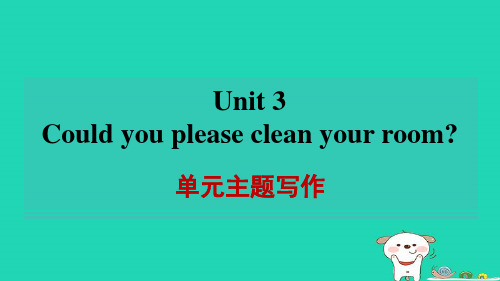
Unit 3 Could you please clean your room?
单元主题写作
一、话题分析 本单元以“家务与许可(chores and permission) ”为
话题, 围绕家庭中的日常事务展开。
二、素材积累 (一)“做家务” 类话题常用的词汇: do the dishes // take out the rubbish // fold the clothes // sweep the floor // make the bed // clean the living room // do the housework // share the housework // look after/take care of
中间句 1. She came home from work and found the house clean
and tidy. 2. I understand that we need to share the housework with
our parents. 3. Housework isn’t a waste of time for students.
(三) 名言警句 1. Labor can arouse people’s creativity.
劳动能唤起人的创造力。 2. Practice makes perfect.
熟能生巧。
(四) 句子升格 1. We should do the housework. (用It is. . . to. . . 升格
____M__y__m__o_th__er___h_a_d__s_o_m__e_th_i_n_g__i_m__p_o_r_ta_n_t___to___d_o__l_a_st_ _S_u_n_d_a_y__a_n_d__w_o_u_l_d_n_’_t_g_e_t_b_a_c_k__h_o_m__e_u_n_t_i_l _5_:0_0__p_._m_._, _s_o_I_ _d_e_c_id_e_d__t_o_d_o__th__e_c_h_o_r_e_s_a_n_d__g_iv_e__h_e_r_a_s_u_r_p_r_i_s_e._________ ____I_n_t_h_e__m_o_r_n_i_n_g_,_I_q__u_ic_k_l_y_f_i_n_is_h_e_d__m_y__h_o_m__e_w_o_r_k__a_n_d_ _b_e_g_a_n__to__w_a_s_h__th_e__d_is_h_e_s_.____________________________
八年级英语下册-Unit-3-Could-you-please-clean-your-room-Se
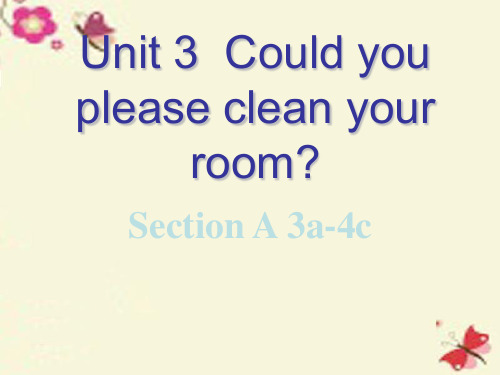
3b
Read the sentences below. Underline the sentences from the reading that mean the same thing.
1. Neither of us did any housework for a week. For one week, she did not do any housework and neither did I. 2. My mom came over as soon as I sat down in front of the TV. The minute I sat down in front of the TV, my mom came over. 3. You're tired, but I'm tired, too. Well, I work all day at school, too! I'm just as tired as you are!
not to get it wet.
1—d 2—a 3—c 4—e 5—b
4b Fill in the blanks in the conversation.
A: I hate to __d__o__ chores.
B: Well, I hate some chores too, but I like other chores.
2. Could I watch one show first? (noun) ___C_o_u_l_d_y_o_u__p_l_ea_s_e__sh_o_w__m__e_y_o_u__r_n_e_w__b_o_o_k_?__(v_e_r_b_)___ 3. I can't work all day. (verb) __I_t_’s__d_if_f_ic_u_l_t_t_o_f_in__d_w__o_rk__i_n_t_h_i_s_c_it_y_._(_n_o_u_n_)________ 4. You watch TV all the time. (verb) __H__o_w__m__u_c_h_i_s_t_h_a_t_w_a_t_c_h_?__(n_o_u__n_) _________________ 5. “What happened?” she asked in surprise. (noun) __I_t_w__o_n_'t__su__rp__ri_s_e_m__e_i_f_h_e_l_o_s_e_s_t_h_e_e_x_a_m__. _(v_e_r_b_)_____
八年级下册人教版英语Unit3_Could_you_please_clean_your_room课件
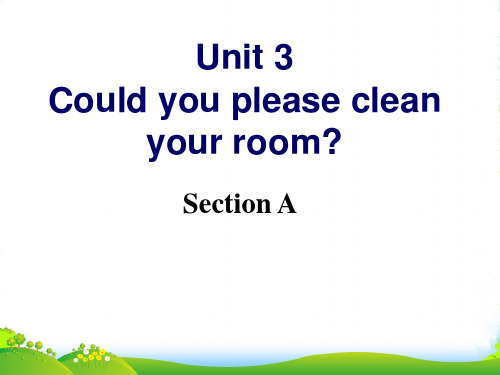
2. have to有人称、数、时态的变化, 而must只有一种形式。但must 可 用于间接引语中表示过去的必要 或义务。
He had to look after his sister yesterday.
3. 在否定结构中: don’t have to 表示 “不必”, mustn’t 表示“禁止”。 You don’t have to tell him about it. 你不一定要把此事
√
room
1c Pairwork
A: Could you please sweep the floor? B: Yes, sure. / I’m sorry, but I’m
reading the newspaper.
2a Listening and check “yes” or “no”.
have to和must
1. 两词都是 “必须”的意思, have to 表示客观的需要, must 表示 说话人主观上的看法, 既主观 上的必要。
My brother was very ill, so I had to call the doctor in the middle of the night. 我弟弟病得很厉害,我只得半夜里 把医生请来。(客观上需要做这件事) He said that they must work hard. 他说他们必须努力工作。 (主观上要做这件事)
cooking. I _c_a_n_ come later. 2. - _M__u_st_ we clean the windows today?
- No, you _n_e_e_d_n_’_t. You __c_a_nclean them tomorrow.
3. - _M__a_y I watch TV this evening, mum? - No, you _m_u__st_n_’_t. Work _m__u_s_t come first.
人教版八年级下英语Unit 3 Could you please cleanyourroom知识总结
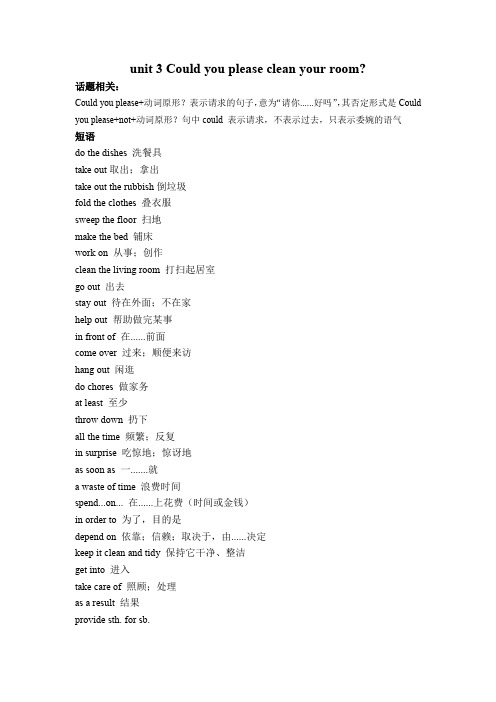
unit 3 Could you please clean your room?话题相关:Could you please+动词原形?表示请求的句子,意为“请你......好吗”,其否定形式是Could you please+not+动词原形?句中could 表示请求,不表示过去,只表示委婉的语气短语do the dishes 洗餐具take out取出;拿出take out the rubbish倒垃圾fold the clothes 叠衣服sweep the floor 扫地make the bed 铺床work on 从事;创作clean the living room 打扫起居室go out 出去stay out 待在外面;不在家help out 帮助做完某事in front of 在......前面come over 过来;顺便来访hang out 闲逛do chores 做家务at least 至少throw down 扔下all the time 频繁;反复in surprise 吃惊地;惊讶地as soon as 一.......就a waste of time 浪费时间spend...on... 在......上花费(时间或金钱)in order to 为了,目的是depend on 依靠;信赖;取决于,由......决定keep it clean and tidy 保持它干净、整洁get into 进入take care of 照顾;处理as a result 结果provide sth. for sb.=provide sb. with sth. 为某人提供某物a developed country 一个发达国家a developing country 一个发展中国家a life of independence 独立的生活an independent country 一个独立自主的国家have no idea “不知道”=don't knowtake care of “照顾;处理”=look after=care for take good care of “好好照顾......”=look after.....well as a result 结果;因此as a result of 由于.......;作为......结果句型和固定结构finish doing sth. 做完某事neither+连系动词be/助动词/情态动词+主语. .....也不hate to do sth. 厌恶做某事let sb. do sth. 让某人做某事spend...doing sth. 花费......做某事provide sth. for sb. 向某人提供某物learn to do sth. 学会做某事learn how to do sth. 学会怎样做某事do one's part in (doing) 尽自己的职责做某事as.....as... 与.......一样not as/so...as... 不如......borrow sth. from sb. “向某人借某物”hate sb./sth. 讨厌某人/某物hate to do sth./doing sth. 厌恶做某事enjoy doing sth 喜欢做某事buy sb.sth.=buy sth. for sb. "给某人买某物invite sb. to +地点名词“邀请某人到某地”invite sb. to do sth. “邀请某人做某事”make sb. do sth. 让/使某人做某事help with sth. =help (to) do sth.帮忙做某事There is no need for sb. to do sth.“对于某人来说,没有必要做某事”解释minute n.分钟;片刻(1)any minute now “随时;马上;在任何时刻”,表示事情有可能在极短的时间内发生或眼下就要发生。
人教版英语八年级下册Unit3《Couldyoupleasecleanyourroom》说课稿
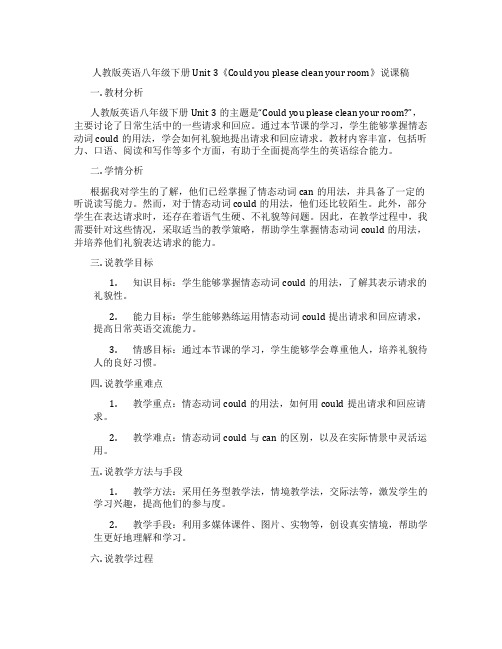
人教版英语八年级下册Unit 3《Could you please clean your room》说课稿一. 教材分析人教版英语八年级下册Unit 3的主题是“Could you please clean your room?”,主要讨论了日常生活中的一些请求和回应。
通过本节课的学习,学生能够掌握情态动词could的用法,学会如何礼貌地提出请求和回应请求。
教材内容丰富,包括听力、口语、阅读和写作等多个方面,有助于全面提高学生的英语综合能力。
二. 学情分析根据我对学生的了解,他们已经掌握了情态动词can的用法,并具备了一定的听说读写能力。
然而,对于情态动词could的用法,他们还比较陌生。
此外,部分学生在表达请求时,还存在着语气生硬、不礼貌等问题。
因此,在教学过程中,我需要针对这些情况,采取适当的教学策略,帮助学生掌握情态动词could的用法,并培养他们礼貌表达请求的能力。
三. 说教学目标1.知识目标:学生能够掌握情态动词could的用法,了解其表示请求的礼貌性。
2.能力目标:学生能够熟练运用情态动词could提出请求和回应请求,提高日常英语交流能力。
3.情感目标:通过本节课的学习,学生能够学会尊重他人,培养礼貌待人的良好习惯。
四. 说教学重难点1.教学重点:情态动词could的用法,如何用could提出请求和回应请求。
2.教学难点:情态动词could与can的区别,以及在实际情景中灵活运用。
五. 说教学方法与手段1.教学方法:采用任务型教学法,情境教学法,交际法等,激发学生的学习兴趣,提高他们的参与度。
2.教学手段:利用多媒体课件、图片、实物等,创设真实情境,帮助学生更好地理解和学习。
六. 说教学过程1.导入:通过播放一段关于孩子们日常生活的视频,引出本节课的主题“Could you please clean your room?”。
2.新课呈现:介绍情态动词could的用法,并通过例句展示如何用could提出请求和回应请求。
人教版 八年级英语 下册 Unit3Could_you_please_clean_your_room
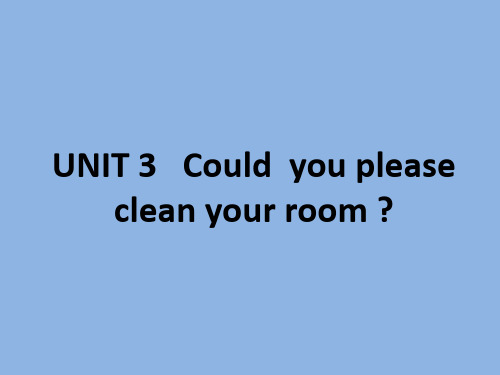
invite my friends to a party
go to the store use your CD player
Listen to a conversation between Sandy
a party? Parent: No, you can’t have a party.
You have a test on Monday.
Parent: Could you please…? Child: Yes, sure. / Sorry, I can’t. I
have to ...
clean your room
parents
5. go to the store 6. use your CD player 7. take out the rubbish
parents 8. make your bed
1b Use the phrases in 1a to make
conversations.
Parent: Could you clean your room? Child: Yes, I can. Child: Could I invite my friends to
Li Lei can’t dance , neither can I. neither can Mary. neither can we.
Neither of …是both of … 的否定句 Both of my parents are teathers .(否定句) Neither of my parents is a teacher .
人教版八年级下册Unit 3Could you please clean your room 全英文说课稿

人教版八年级下册Unit 3Could you please clean your room? 全英文说课稿G ood morning, judges. it’s my great pleasure to be here to share my teaching ideas with all of you. the lesson i’m going to talk about is from unit11“could you please clean your room?” in go for it fo r the students of grade 8. i will analyze the lesson from six parts: analysis of teaching material, student analysis, teaching methods, studying ways, teaching steps and blackboard design.part one : analysis of teaching materialfirst, I’d like to show m y understanding of teaching material which includes 5 aspects.1. status and functionthe title of this unit is “could you please clean your room?”, and the topic is about chores. it mainly talks about making polite requests and asking for permissions. id ivided this unit into five periods, and today i’d like to talk about the first period of this unit. if students can learn it well, it will be helpful for the students to learn the rest of this unit. besides, such topic is related to students’ daily life, s o it can raise students’ learning interest and improve students’ spoken english. in this lesson, students will learn some new words and phrases about chores and learn to make polite requests and ask for permission by using modal verb “could”.2. teaching aimsaccording to the teaching material and the new curriculum of english, i hope the following aims can be achieved in this lesson.a knowledge aims1) by the end of the class, students should master the key words and phrases of this lesson: do the chores, do the dishes, sweep the floor, etc2) students should master the key structures:could you please take out the trash?surecould I borrow the car?sorry, but I need it. I have to go to a meeting.b ability aims1) to improve students’ ability of listen ing and speaking.2) to cultivate their ability of cooperating with others.c emotional aims1) make students help their parents with the chores.2) stimulate their interest in learning english.3. leaning strategiesin my class, i’ll treat my students as real masters. i’ll adopt communication strategy to create situations to make the students participate and learn by doing.key teaching points and difficult pointsnext, i’d like to talk about the important points and difficult points,4. the important points ishow to let the students master the key words and key structures.as for difficult points,it is how to use the key words and key structures in the real situation.part two: student analysisthat’s all for my understanding of teaching material, now let’s focus on the student analysis.as we know, the students in the junior school are very active, they want to show themselves but they can’t focus on the class for a long time. but some of them loseinterest in learning english, so when i design my class, i have to pay attention to make my class lively and interesting and design more activities to attract their attention.part three: teaching methodslet’s come to the third part, teaching methods. to achieve the teaching aims above, i adopt task—based teaching method and communicative approach in my class as for learning. since students are the real masters in my class, student-centered teaching method will be used in my class.part four: studying waysas for studying ways, students will work in pairs and groups to do the cooperative learning and learn sentence structures by remember-drill-practice in the real situation.part five : teaching stepsthen comes the most important part, teaching steps.step 1 warming-upI will lead in my class by having a free talk with students like this: what do you usually do at home?then i will introduce the question: do you often help your parents with the chores? it’s a natural way to introduce the content of this lesson and let them start to touch what they’ re going to learn.step 2 learn new words1. I will use cai to present some different chores to and ask students to answer this question: what is he/ she doing?he is doing the dishes.he is taking out the trash.by using this way, i will teach them other phrases of chores. multimedia can makelearning content more lively and specific. it can raise students’ learning interest.2. then i will ask students to play a game. first, i will let the students write the phrases on a card. then turn it over. let their partner guess what they wrote by using the structure: do you want me to do the dishes?this task is to consolidate what they learnt and let them enjoy the happiness of learning english.step3 1aI will get students to ask the questions like this : do you do the dishes at home?I will divide them into groups of four and let students to write down their survey result and report it to the class.this task is to consolidate the key phrases they learnt.step4 presentationfirst, i’ll point to the sample conversation in t he book. ask students to read it aloud. it’s a natural way to introduce the key structures and lay foundation for the next step. then, i will ask students to complete activity 1b.before listening, i will give students some skills on listening. i will tell them you needn’t understand every sentence and you just need to pay attention to the chores and the answer. then i will play the tape. later check the answers with students. after that, ask students turn to p90and read the listening material.this task is to train student’s listening ability and help students have a good pronunciation. and it will help them consolidate the key structures.step5 practice 1cfirst, i will ask two students to read the sample conversation. then point to the picture and let them work in pairs to practice their own conversation. while they practicing, iwill walk around the classroom and offer help to them if necessary. according to their response, i will ask 5 pairs to present their conversations. other students just listen and j udge their performance. i’ll give 3 stars for the best pair.step 6 2a. 2bread the instructions to the students and make sure they know what to do. i will tell them to pay attention to the key words. then i will play the tape for three times. for the first time students only listen. for the second time, they should complete 1a. for the third time, i will ask students to complete 2b. later, check the answers. after that, i will ask students to read the listening material after the tape. i will cultivate their ability of listening and let them be familiar with the key structures.step 7 pairworkin this step, students are going to do a pair work. first, i will ask 2 students to read the sample conversation. then let them work in pairs to practice their own conversations. this task is to train students’ ability of speaking and using the key words and structures in the real situation.step 8 summaryi will make a brief summary with all the students about what we learnt in this period and they should remember as following: we should learn to care about others and be polite.step9 homeworktask1: review what we learnt in this period and recitetask2: practice the dialogue with partner.part six: blackboard designat last, let me show you my blackboard design. the title is in the middle and the keystructures will be under it. on the left, there are some key words and phrases. on the right, there is the result of competition.。
初二英语Unit Could you please clean your room?试题
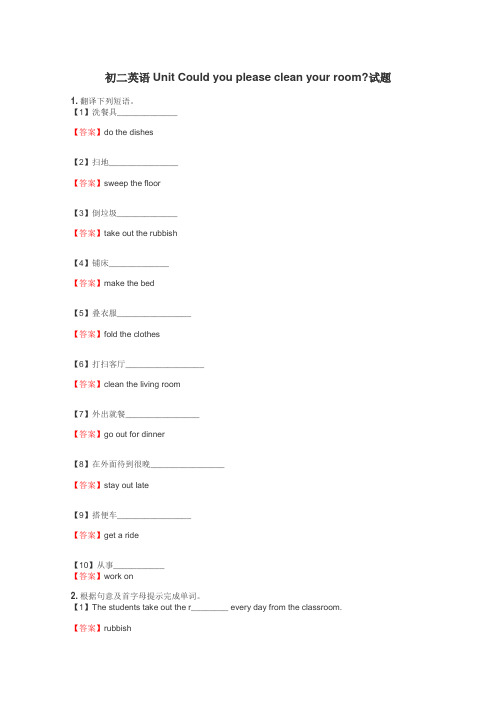
初二英语Unit Could you please clean your room?试题1.翻译下列短语。
【1】洗餐具_____________【答案】do the dishes【2】扫地_______________【答案】sweep the floor【3】倒垃圾_____________【答案】take out the rubbish【4】铺床_____________【答案】make the bed【5】叠衣服________________【答案】fold the clothes【6】打扫客厅_________________【答案】clean the living room【7】外出就餐________________【答案】go out for dinner【8】在外面待到很晚________________【答案】stay out late【9】搭便车________________【答案】get a ride【10】从事___________【答案】work on2.根据句意及首字母提示完成单词。
【1】The students take out the r________ every day from the classroom.【答案】rubbish【解析】分析语境可知,学生每天做值日,从教室带走的应该是垃圾,即rubbish。
【2】After getting up, will you f_______ your quilts?【答案】fold【解析】根据前半句“After getting up”以及your quilts,推断为fold。
【3】The classroom is in a m______. Can you clean it up?【答案】mess【解析】由后半句“Can you clean it up?”,可知教室很乱,即in a mess。
【4】A dog is sleeping on the f________.【答案】floor【解析】分析语境可知,此处指的应该是“一只狗正在地板上睡觉”,即floor。
八年级英语下册 Unit 3 Could you please clean your room短语、句型、作文汇总 (新版)人教新目标版
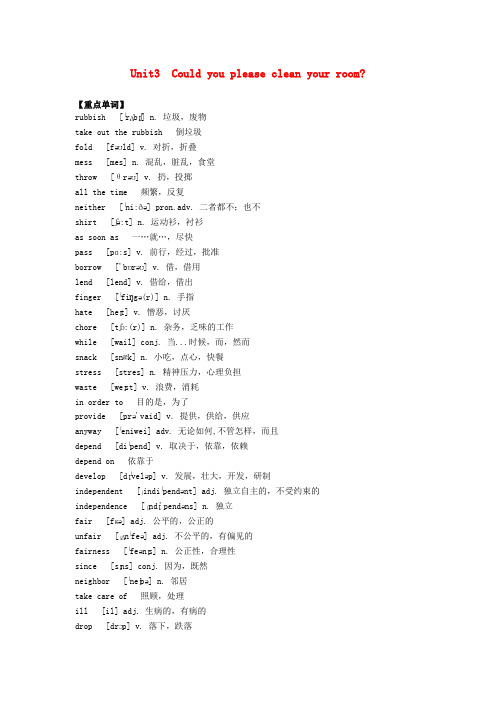
Unit3 Could you please clean your room?【重点单词】rubbish [ˈrʌbɪʃ] n. 垃圾,废物take out the rubbish 倒垃圾fold [fəʊld] v. 对折,折叠mess [mes] n. 混乱,脏乱,食堂throw [θrəʊ] v. 扔,投掷all the time 频繁,反复neither [ˈni:ðə] pron.adv. 二者都不;也不shirt [ʃə:t] n. 运动衫,衬衫as soon as 一…就…,尽快pass [pɑ:s] v. 前行,经过,批准borrow ['bɒrəʊ] v. 借,借用lend [lend] v. 借给,借出finger [ˈfiŋgə(r)] n. 手指hate [heɪt] v. 憎恶,讨厌chore [tʃɔ:(r)] n. 杂务,乏味的工作while [wail] conj. 当...时候,而,然而snack [snæk] n. 小吃,点心,快餐stress [stres] n. 精神压力,心理负担waste [weɪst] v. 浪费,消耗in order to 目的是,为了provide [prə'vaid] v. 提供,供给,供应anyway [ˈeniwei] adv. 无论如何,不管怎样,而且depend [diˈpend] v. 取决于,依靠,依赖depend on 依靠于develop [dɪˈveləp] v. 发展,壮大,开发,研制independent [ˌindiˈpendənt] adj. 独立自主的,不受约束的independence [ˌɪndɪ'pendəns] n. 独立fair [fɛə] adj. 公平的,公正的unfair [ˌʌnˈfeə] adj. 不公平的,有偏见的fairness [ˈfeənɪs] n. 公正性,合理性since [sɪns] conj. 因为,既然neighbor [ˈneɪbə] n. 邻居take care of 照顾,处理ill [il] adj. 生病的,有病的drop [drɔp] v. 落下,跌落【重点短语】1.go out for dinner 出去吃饭2.stay out late 在外面待到很晚3.go to the movies 去看电影4.get a ride 搭车5.work on 从事6.finish doing sth. 完成做某事7.clean and tidy 干净整洁的8.do the dishes 洗餐具9.take out the rubbish 倒垃圾10.fold your/the clothes 叠衣服11.sweep the floor 扫地12.make your/the bed 整理床铺13.clean the livng room 打扫客厅14.no problem 没问题15.welcome sb. 欢迎某人e home from school/work放学/下班回家17.throw down 扔下18.sit down 坐下e over 过来20.take sb. for a walk 带某人去散步21.all the time 一直;总是22.all day/evening 整曰/夜23.do housework 做家务24.shout back 大声回应25.walk away 走开26.share the housework 分担家务27.a comfortable home 一个舒适的家28.in surprise 惊讶地29.get something to drink 拿点喝的东西30.watch one show 观看一个节目31.hang out 闲逛32.pass sb. sth. 把某物传给某人33.lend sb. sth. 把某物借给某人34.get sth. wet 使某物弄湿35. hate to do sth. 讨厌做某事36.do chores 做杂务37.help sb. (to ) d o /with sth•帮助某人干某事38.bring a tent带顶帐篷来39.buy some snacks买些小吃40.go to the store去商店41.invite sb. to a party邀请某人参加聚会42.make sb. do sth. 使某人做某事43.enough stress足够的压力44.a waste of time浪费时间45.in order to为了46.get good grades取得好成绩47.mind doing sth. 介意做某事48.depend on依赖;依靠49.develop children ’ s independence发展孩子的独立性50.look after/take care of 照顾;照看51.do one’ s part in (doing ) sth. 做某人分内的事【重点句型】1.Could you please clean your room? 你能打扫一下你的房间吗?2. I have to do some work. 我必须干些活。
八年级英语下册Unit3知识点总结-Could-you-please-clean-your-room
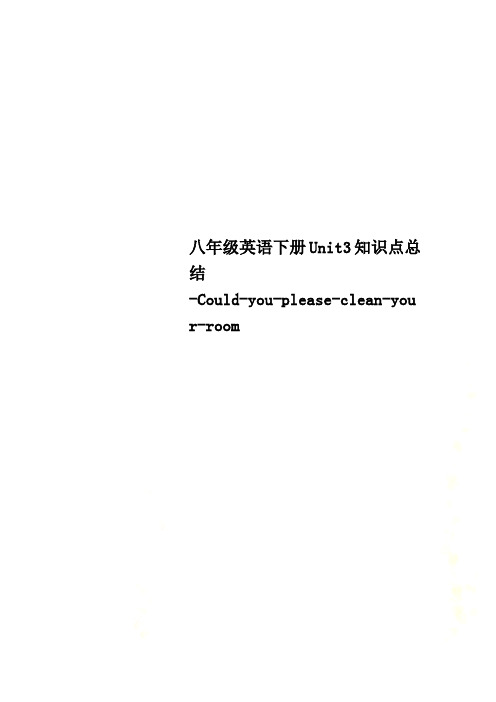
八年级英语下册Unit3知识点总结-Could-you-please-clean-you r-room八年级英语下册Unit3知识点总结-Could-you-please-clean-you r-roomUnit3 Could you please clean your room? Peter ,could you please take out the trash? 彼得,你能把垃圾倒了吗?Could you please do sth ?请你(做)......好吗?用于提出请求,希望得到对方的肯定回答,说话的语气比较客气委婉。
Could 不是can的过去式,是委婉、礼貌的说法。
回答用can.【常用答语】肯定回答:Sure./ Of course./ Certainly./No problem. 否定回答:Sorry , I can’t2、take out 取出(v+ adv)【注】: 跟代词做宾语,代词放中间;跟名词做宾语,可放在中间,也可放在后边His teeth hurt badly. The dentist take them out .【短语】take out the trash 倒垃圾take a walk 散步take away 拿走,取走take back 收回take place 发生takeoff 脱下;起飞3. Can you do the dishes.?那你可以洗盘子吗?do the dishes 洗碗【结构1】do the +名词:do the dishes/ laundry 洗餐具/衣服【结构2】do the +动词-ing do the cleaning 打扫卫生【结构3】do one’s + 名词do one’s housework/ homework 做家务/家庭作业【结构4】do some +动词-ing do some reading/ shopping 读写书/购物Could I at least finish watching this show? 至少让我看完这个节目可以吗?1】Could I do a sth? 我可以做......吗?用于表达请求,语气比较委婉。
人教版英语八年级下册Unit 3《Could you please clean your room》
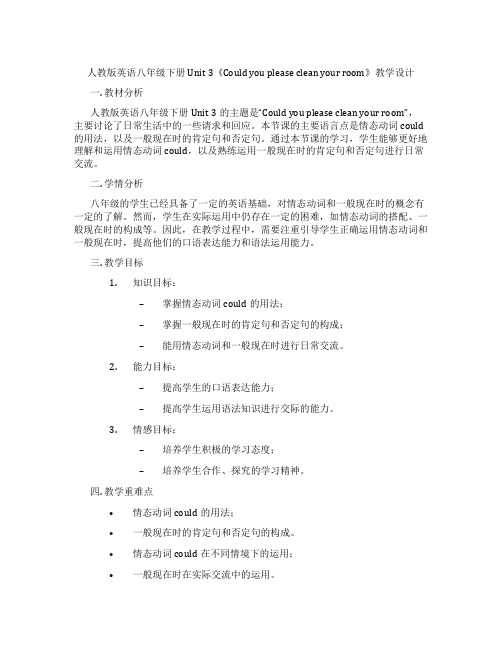
人教版英语八年级下册Unit 3《Could you please clean your room》教学设计一. 教材分析人教版英语八年级下册Unit 3的主题是“Could you please clean your room”,主要讨论了日常生活中的一些请求和回应。
本节课的主要语言点是情态动词could 的用法,以及一般现在时的肯定句和否定句。
通过本节课的学习,学生能够更好地理解和运用情态动词could,以及熟练运用一般现在时的肯定句和否定句进行日常交流。
二. 学情分析八年级的学生已经具备了一定的英语基础,对情态动词和一般现在时的概念有一定的了解。
然而,学生在实际运用中仍存在一定的困难,如情态动词的搭配、一般现在时的构成等。
因此,在教学过程中,需要注重引导学生正确运用情态动词和一般现在时,提高他们的口语表达能力和语法运用能力。
三. 教学目标1.知识目标:–掌握情态动词could的用法;–掌握一般现在时的肯定句和否定句的构成;–能用情态动词和一般现在时进行日常交流。
2.能力目标:–提高学生的口语表达能力;–提高学生运用语法知识进行交际的能力。
3.情感目标:–培养学生积极的学习态度;–培养学生合作、探究的学习精神。
四. 教学重难点•情态动词could的用法;•一般现在时的肯定句和否定句的构成。
•情态动词could在不同情境下的运用;•一般现在时在实际交流中的运用。
五. 教学方法1.任务型教学法:通过设定各种现实生活中的任务,引导学生运用所学知识进行完成,提高学生的实际运用能力。
2.情境教学法:创设各种生活情境,让学生在真实的环境中感受和理解语法知识。
3.合作学习法:学生进行小组讨论和合作,培养学生的团队精神和学习兴趣。
六. 教学准备1.教学材料:人教版英语八年级下册教材;2.教学辅助材料:PPT、图片、卡片等;3.教学设备:投影仪、电脑、黑板等。
七. 教学过程1.导入(5分钟)–利用PPT展示一些杂乱的房间图片,引导学生谈论房间的情况,激发学生的学习兴趣。
八年级英语下册Unit3《Couldyoupleasecleanyourroom》(讲)(含解析)(新版)人教新目标版
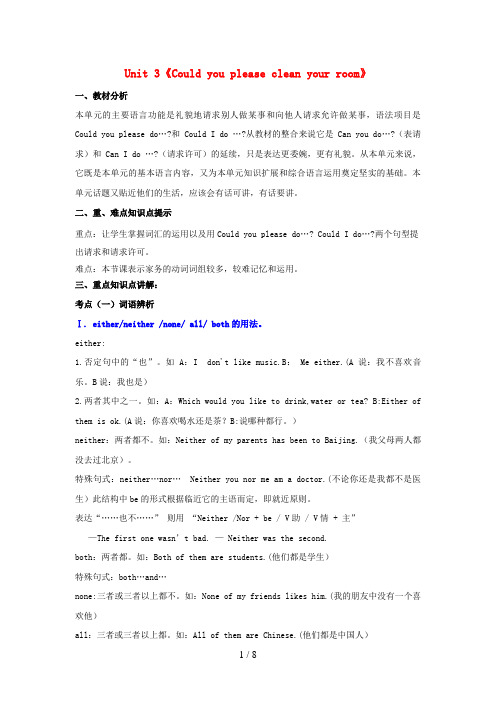
Unit 3《Could you please clean your room》一、教材分析本单元的主要语言功能是礼貌地请求别人做某事和向他人请求允许做某事,语法项目是Could you please do…?和Could I do …?从教材的整合来说它是Can you do…?(表请求)和Can I do …?(请求许可)的延续,只是表达更委婉,更有礼貌。
从本单元来说,它既是本单元的基本语言内容,又为本单元知识扩展和综合语言运用奠定坚实的基础。
本单元话题又贴近他们的生活,应该会有话可讲,有话要讲。
二、重、难点知识点提示重点:让学生掌握词汇的运用以及用Could you please do…? Could I do…?两个句型提出请求和请求许可。
难点:本节课表示家务的动词词组较多,较难记忆和运用。
三、重点知识点讲解:考点(一)词语辨析Ⅰ. either/neither /none/ all/ both的用法。
either:1.否定句中的“也”。
如 A:I don't like music.B: Me either.(A说:我不喜欢音乐。
B说:我也是)2.两者其中之一。
如:A:Which would you like to drink,water or tea? B:Either of them is ok.(A说:你喜欢喝水还是茶?B:说哪种都行。
)neither:两者都不。
如:Neither of my parents has been to Baijing.(我父母两人都没去过北京)。
特殊句式:neither…nor… Neither you nor me am a doctor.(不论你还是我都不是医生)此结构中be的形式根据临近它的主语而定,即就近原则。
表达“……也不……” 则用“Neither /Nor + be / V助 / V情 + 主”—The first one wasn’t bad. — Neither was the second.both:两者都。
人教版八年级英语下册Unit 3 Could you please clean your room

【归纳拓展】order用法小结 (1)order作名词, 意为“命令; 指示; 顺序; 订单”等。例如: Please put these shoes in order. 请把这些鞋子按顺序放好。 (2)order作动词, 意为“命令; 点(菜、饮料等); 订(货); 预订” 等。后接名词作宾语。例如: I just want to order a glass of juice. 我只是想点一杯果汁。
2. I think it is important for children to learn how to do chores and help their parents with housework. 我认为对孩子们来说学习如何做家务和帮助父母做家务是很 重要的。
【自主领悟】本句是一个含有宾语从句的主从复合句, 其句式 结构如下:
5. help with 6. spend time on sth. 7. as a result 8. fall ill 答案: 5. 在某方面帮助; 帮助做某事 6. 花时间做某事 7. 结果是; 因此 8. 生病; 病倒
Ⅱ. 阅读短文, 判断正误(T/F) ( )1. Mr. Smith thinks housework is a waste of time for kids. ( )2. Mr. Smith doesn’t think it’s the parents’ job to provide a clean and comfortable environment at home for children. ( )3. It’s difficult and boring for Mr. Smith to do chores. ( )4. Ms. Miller thinks it’s important for children to learn how to do chores and help with housework. ( )5. Ms. Miller thinks doing chores is helpful for children to develop their independence. 答案: 1~5. TFFTT
八年级英语下册 Unit 3 Could you please clean your room短语、语法知识点汇总 (新版)人教新目标版

Unit 3 Could you please clean your room一、必背短语【教材内容解析】Section A1.Peter, could you please take out the rubbish? (P. 17)(1)Could you please...?意为“你能……吗?”,could在此并不是过去式,而是表示一种委婉的语气,please后接动词原形,肯定回答用Sure/Of course/Certainly,也可以用...can,不可以用...could;否定回答用Sorry...并给出理由,也可用...can’t/mustn’t。
---Could you please help me with my homework?--Sure./Of course./Certainly./Sorry, I can’t. I’m busy now.(2)take out意为“带出去”,代词作宾语时,要放在take和out之间。
The dog is noisy. Take it out.2.Could I at least finish watching this show? (P. 18)(1)at least表示“至少”,反义词为at most“至多”。
The ticket cost at least 200 yuan.(2)finish意为“完成、做好”,后接动词作宾语时,要用doing的形式。
When are you going to finish your work?3. Yes, because Mom will be back from shopping any minute now. (P. 18)be back意为“回来”,相当于come back,前者侧重指状态,后者侧重指动作。
She has been back for two days. You came back very late last night.4.And she won’t be happy if she sees this mess. (P. 18)mess用作名词,表示“杂乱、不整洁”,常用的短语为:make a mess“搞得一团糟”;in a mess“一团糟”。
人教版八年级英语下册-Unit-3-Could-you-please-clean-your-room-重点词组+重点句型+重点语法+综合练习题
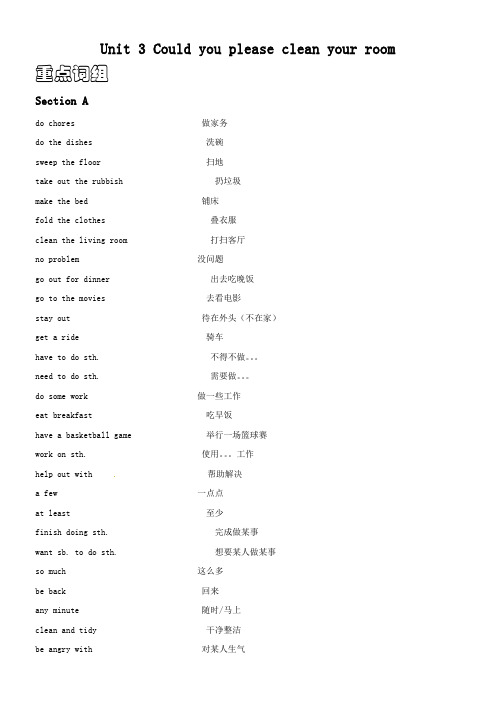
Unit 3 Could you please clean your room 重点词组Section Ado chores 做家务do the dishes 洗碗sweep the floor 扫地take out the rubbish 扔垃圾make the bed 铺床fold the clothes 叠衣服clean the living room 打扫客厅no problem 没问题go out for dinner 出去吃晚饭go to the movies 去看电影stay out 待在外头(不在家)get a ride 骑车have to do sth. 不得不做。
need to do sth. 需要做。
do some work 做一些工作eat breakfast 吃早饭have a basketball game 举行一场篮球赛work on sth. 使用。
工作help out with 帮助解决a few 一点点at least 至少finish doing sth. 完成做某事want sb. to do sth. 想要某人做某事so much 这么多be back 回来any minute 随时/马上clean and tidy 干净整洁be angry with 对某人生气solve the problem 解决问题throw down 扔下in front of 在。
前面come over 过来take...for a walk 带。
去散步all the time 一直all day 整个白天do housework 做家务all evening 整个夜晚shout back 吼叫还击walk away 走开come home from work 下班回家in surprise 惊讶地share the housework 分担家务sit down 坐下hang out 出去玩help sb. (to) do sth. 帮助某人做某事how much 多少come back 回来try (not) to do sth. 努力(不)做某事hate to do sth. 讨厌做某事Section Bask sb. to do sth. 让某人做某事next to 靠近have a party 参加派对have a test 参加考试mean doing sth. 意味着。
